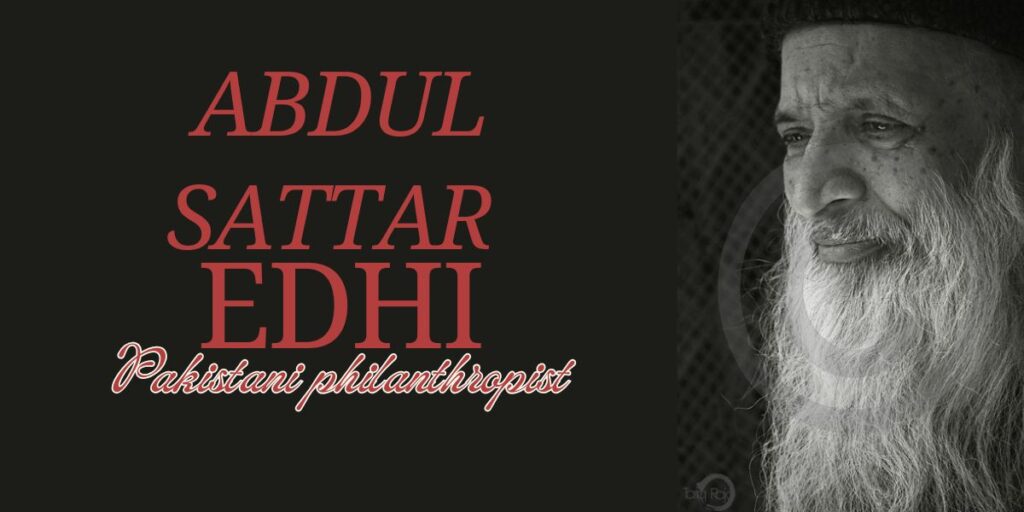Abdul Sattar Edhi, a name synonymous with compassion and selflessness, was a Pakistani philanthropist whose life story is an inspiring testament to the power of service to humanity. Born on February 28, 1928, in Bantva, India, Edhi faced numerous challenges throughout his life, yet he emerged as a beacon of hope for countless individuals in need. His remarkable contributions to society have left an indelible mark, making him a revered figure not only in Pakistan but across the globe. This essay delves into the life, work, and legacy of Abdul Sattar Edhi, highlighting his unwavering commitment to helping the underprivileged and his profound impact on humanitarian efforts.
Early Life and Education
Abdul Sattar Edhi’s early life was shaped by the values instilled in him by his parents. His mother, a devout woman, played a crucial role in nurturing his sense of compassion. After the partition of India in 1947, Edhi and his family migrated to Pakistan. The socio-economic challenges faced by many during this tumultuous period deeply affected him, prompting him to dedicate his life to alleviating the suffering of others.
Edhi’s formal education was limited, as he was compelled to leave school at an early age to support his family. However, his desire for knowledge remained unquenched. He learned about the plight of the needy and developed a profound understanding of the socio-economic issues affecting his community. This knowledge fueled his ambition to make a difference.
Founding the Edhi Foundation
In 1951, Edhi established the Edhi Foundation, which has since become one of the largest and most comprehensive social welfare organizations in Pakistan. With a mere initial investment, Edhi’s vision was to create a network of services that catered to the marginalized. The foundation’s services range from providing free healthcare, education, and shelter to the homeless, to operating a vast ambulance service that has saved countless lives.
Edhi’s approach was unique; he emphasized the importance of self-reliance and empowerment. He encouraged people to contribute to the foundation, both financially and through volunteer work. His motto, “Live and help live,” resonated with many, fostering a culture of altruism within society.
Humanitarian Efforts
Abdul Sattar Edhi’s humanitarian efforts were not limited to Pakistan. His work extended beyond borders, reflecting his belief in universal brotherhood. He provided aid during natural disasters, conflicts, and crises worldwide. From assisting refugees in war-torn regions to offering medical support during epidemics, Edhi’s commitment to humanity was unwavering.
His efforts garnered international recognition, and he was nominated for the Nobel Peace Prize multiple times. However, Edhi remained humble, often stating that he sought no accolades for his work—only the satisfaction of helping others. His dedication to humanitarianism earned him the title of “Angel of Mercy.”
Challenges and Resilience
Despite his monumental achievements, Edhi faced numerous challenges. He encountered skepticism from various quarters regarding his motives and the effectiveness of his organization. Additionally, the political landscape of Pakistan posed obstacles, as the foundation often operated in a challenging environment. Nevertheless, Edhi’s resilience shone through.
His unwavering faith in humanity propelled him forward. He believed that kindness could transcend barriers, and this belief was evident in the diverse range of individuals he served. Edhi’s ability to unite people from different backgrounds and faiths for a common cause was a hallmark of his work.
Legacy and Influence
Abdul Sattar Edhi’s legacy is felt not only in the institutions he established but also in the hearts of those he inspired. His life serves as a reminder that individual actions can lead to monumental changes. Edhi’s commitment to social justice and humanitarianism has inspired a new generation of philanthropists and volunteers.
The Edhi Foundation continues to operate, providing essential services to those in need. It has become a symbol of hope and compassion in Pakistan, reflecting Edhi’s core values. Schools, hospitals, and orphanages bear his name, ensuring that his mission to serve humanity endures.
Conclusion
Abdul Sattar Edhi’s life is a powerful narrative of selflessness, resilience, and unwavering dedication to the welfare of others. His work transcended boundaries, uniting people in a common pursuit of compassion and service. As we reflect on his legacy, we are reminded of the profound impact one individual can have on society. Edhi’s journey teaches us that true greatness lies not in wealth or power, but in the ability to uplift others and make the world a better place. His enduring spirit continues to inspire countless individuals to follow in his footsteps, fostering a culture of kindness and service that remains essential in today’s world.
FAQs
Who was Abdul Sattar Edhi?
Abdul Sattar Edhi was a renowned Pakistani philanthropist and humanitarian known for founding the Edhi Foundation, one of the largest social welfare organizations in Pakistan.
What did the Edhi Foundation do?
The Edhi Foundation provides a wide range of services, including free healthcare, education, shelter for the homeless, and an extensive ambulance service.
Why is Abdul Sattar Edhi considered a hero?
He is considered a hero for his lifelong dedication to serving the underprivileged, his selfless humanitarian work, and his belief in universal brotherhood.
What is Edhi’s legacy?
Edhi’s legacy includes the institutions he founded, his philosophy of compassion and service, and the inspiration he provides to future generations of philanthropists.
Did Abdul Sattar Edhi receive any awards?
Edhi was nominated for the Nobel Peace Prize multiple times and received numerous national and international accolades for his humanitarian efforts.







